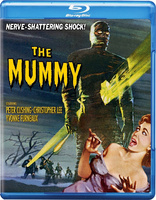The Mummy Blu-ray Movie
HomeThe Mummy Blu-ray Movie 
Warner Bros. | 1959 | 88 min | Not rated | Oct 06, 2015Movie rating
7.2 | / 10 |
Blu-ray rating
| Users | 4.0 | |
| Reviewer | 3.5 | |
| Overall | 3.5 |
Overview
The Mummy (1959)
In the 1890s a team of British archaeologists discover the untouched tomb of Princess Ananka but accidentally bring the mummified body of her High Priest back to life. Three years later back in England a follower of the same Egyptian religion unleashes the mummy to exact grisly revenge on the despoilers of the sacred past.
Starring: Peter Cushing, Christopher Lee, Yvonne Furneaux, Eddie Byrne, Felix AylmerDirector: Terence Fisher
| Horror | 100% |
Specifications
Video
Video codec: MPEG-4 AVC
Video resolution: 1080p
Aspect ratio: 1.67:1
Original aspect ratio: 1.75:1
Audio
English: DTS-HD Master Audio Mono (48kHz, 24-bit)
French: Dolby Digital Mono
Spanish: Dolby Digital Mono
Spanish: Dolby Digital Mono (Spain)
Subtitles
English SDH, French, Japanese, Spanish
Discs
25GB Blu-ray Disc
Single disc (1 BD)
Playback
Region A, B (C untested)
Review
Rating summary
| Movie | 3.5 | |
| Video | 3.5 | |
| Audio | 3.5 | |
| Extras | 0.5 | |
| Overall | 3.5 |
The Mummy Blu-ray Movie Review
Death Be Not Proud
Reviewed by Michael Reuben October 7, 2015The sole non-sequel in Warner Home Video's first volume of Hammer Horror Films is the British studio's 1959 version of The Mummy, the first of its official remakes of a property licensed from Universal, which was so impressed with the success of Horror of Dracula the previous year that it invited Hammer to rifle its library of horror classics for story ideas. Dracula's writer, Jimmy Sangster, drew from several films in Universal's vault, but notably missing from the list was the 1932 Boris Karloff original that first presented the eerie figure of a 3000-year-old Egyptian corpse restored to life. Karloff's Imhotep managed to pass for human, but Sangster preferred the bandage-wrapped monster who haunted later Universal films like The Mummy's Hand and The Mummy's Tomb. Plot elements from both films, as well as The Mummy's Ghost, found their way into Sangster's script. Made by the same creative team responsible for Horror of Dracula and anchored by the stars of that film, Christopher Lee and Peter Cushing, The Mummy is a high water mark in Hammer's history and, for many viewers, one of the most memorable of all mummy movies. Unlike the jokey 1999 reboot by Stephen Sommers, Hammer's version took both its monster and its hero seriously and maintained a consistent tone throughout. Hammer's cinematographer, Jack Asher, used boldly stylized color to create a distinctive style that is now permanently associated with Hammer Films and was as much a part of the fun for audiences as Lee's fierce gaze peering out from beneath his rotting ancient wrap. Unlike Sommers forty years later, director Terence Fisher could not rely on CGI to create his monster's violence; he had to use practical effects, and they are so realistic that Christopher Lee sustained multiple injuries during the making of the film, some of which reportedly troubled him for the rest of his life.
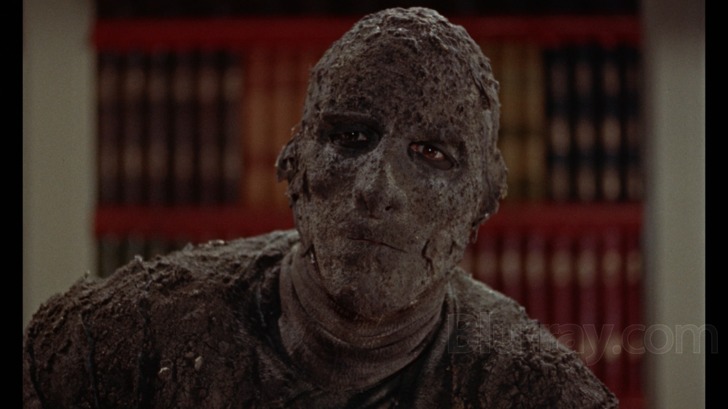
In 1895, an expedition led by three archaeologists unearths the long-buried tomb of the Egyptian princess, Ananka, and returns to England with her sarcophagus and other valuable artifacts. But there are casualties. The youngest member of the team, John Banning (Cushing), is so excited by the find that he postpones a trip to Cairo to have his broken leg set properly and now walks with a permanent limp. (This script detail is supposed to have been added to accommodate an injury sustained by the actor before filming.) Banning's father, Stephen (Felix Aylmer), apparently suffers a mental breakdown from the excitement of finding Ananka's sarcophagus. We in the audience know that Banning Sr. was actually stricken with terror after he read from a mysterious scroll embedded in the nearby wall, but the full scene isn't played until a mid-film flashback. The only member of the party to return unscathed is Banning's uncle, Joseph Whemple (Raymond Huntley, Upstairs, Downstairs). Before leaving Egypt, the team blows up Ananka's tomb, thereby contributing to the great tradition of movie archaeologists who decimate their finds instead of preserving them. (Consider, for example, the irreparable damage done by Indiana Jones to the Well of Souls, even before he was sealed in.) Unbeknownst to John Banning and Joseph Whemple, an Egyptian named Mehemet Bey (George Pastell) has smuggled the scroll discovered by Stephen Banning out of the tomb. It is, in fact, the Scroll of Life, capable of raising the dead. Having warned Whemple and Banning Sr. not to enter the tomb, Bey now plans to use the scroll to resurrect Ananka's guardian, the mummy known in life as Kharis (Lee), high priest of the god Karnak. Through Kharis, Bey will exact revenge on the three explorers who desecrated Ananka's tomb. (It isn't clear what this will actually accomplish, since Ananka herself will remain on display in the British Museum, and her tomb is permanently destroyed. But never mind.) John Banning returns to his life with wife Isobel (Yvonne Furneax) on his country estate. The only dark spot is his father's continuing mental illness, which has led to his confinement in the Engerfield Nursing Home. After three years, however, Banning Sr. suddenly comes around and summons his son to tell a fantastic tale of a living mummy. This event coincides with the arrival of Mehemet Bey in England bearing a large box of ancient Egyptian "relics". The drunken incompetence of two English carters causes the box to be lost in a swamp during transport to Bey's rented home near John Banning, which allows for one of The Mummy's signature scenes: the first appearance of Christopher Lee's Kharis as Bey summons him from the swamp, a muddy figure who rises from the water like a bandaged version of the Creature from the Black Lagoon. As Bey sends Kharis on a killing spree that claims first Stephen Banning and then Joseph Whemple, the film provides a colorful flashback telling the ancient legend of Kharis' forbidden love for Ananka. John Banning relates the tale to both his uncle and a skeptical policeman, Inspector Mulrooney (Eddie Byrne), whose disbelief is eventually overcome by eyewitness accounts and his own experience. But Bey's campaign of revenge hits a snag when Kharis sees Isobel Banning, who bears a striking resemblance to Princess Ananka. Hammer's Mummy dispenses with any subplot involving reincarnation or soul transference in favor of a fortunate coincidence that distracts the reanimated Kharis at critical moments. Isobel's resemblance to the long-dead princess also leads to the film's conclusion, where Kharis kidnaps the woman he thinks is his beloved and carries her to the swamp from which he rose, where she must be rescued by her husband and a band of armed men. For all of the effects makeup, eerie lighting and fancy costume flashbacks, one of the most memorable scenes in The Mummy is a simple exchange of dialogue between Peter Cushing's Banning and George Pastell's Mehemet Bey. Having learned of Bey's presence nearby, Banning goes to confront him. Each knows who the other is, but in typically polite English fashion, both pretend to be meeting for the first time, even as Banning deliberately provokes Bey by insulting his religion and Bey accuses Banning of being a thief, bigot and blasphemer. Emotions run high but are thoroughly reined in, as each man says one thing while meaning another. The scene is virtually a template for the soon-to-come James Bond films in which the not-so-secret agent 007 confronts a well-known villain like Auric Goldfinger or Emilio Largo, and the two engage in a battle of verbal wits as a kind of foreplay to trying to kill one another. It's a classically English approach: We may despise each other, but let us be civil and witty about it.
The Mummy Blu-ray Movie, Video Quality 

While the other three titles in Warner Home Video's first volume of Hammer Horror Films were shot by Arthur Grant, and share the same darkly lit style, The Mummy was photographed by cinematographer Jack Asher, who was also responsible for such early Hammer hits as The Curse of Frankenstein and Horror of Dracula. Except for nighttime exteriors, Asher preferred brighter lighting, and his use of vivid, often fluorescent washes of color (typically greens or reds), without any concern for the light's source, are a classic element of the style associated with Hammer horror. A good example can be seen when Stephen Banning and Joseph Whemple first enter the chamber containing Princess Ananka's sarcophagus. The cavern, which has just been opened for the first time in centuries, is thoroughly illuminated with a green glow that seems to emanate from nowhere. Scanned at 2k from an IP for this 1080p, AVC-encoded Blu-ray, The Mummy has a noticeably softer and less detailed image than the three other Hammer films in this first volume from Warner, although it is hard to say whether that is a function of the original photography, the source material, the transfer or a combination of factors. (I suspect the source material is the limiting factor here.) Also, The Mummy is framed at 1.67:1, which would have been the aspect ratio used on European screens, rather than the 1.78:1 that is Warner's standard treatment for films released in the U.S. at 1.85:1. Despite the softer image, however, a significant amount of detail is still present, enough to allow appreciation of the fine points (and limitations) of the costumes, makeup and set design. The colors are excellent, both in the present-day sequences in England and Egypt and in the flashbacks to ancient times, which are more exaggerated and cartoonish. Blacks are solid and deep, and contrast is appropriate. A fine grain pattern is visible throughout. As is the case with all of the films in its first Hammer collection, Warner has mastered The Mummy with a higher bitrate than it has typically achieved in previous catalog releases, in this case an average of 29.84 Mbps. At the very least, there does not appear to have been any filtering of detail to facilitate compression, and the compression has been carefully performed.
The Mummy Blu-ray Movie, Audio Quality 
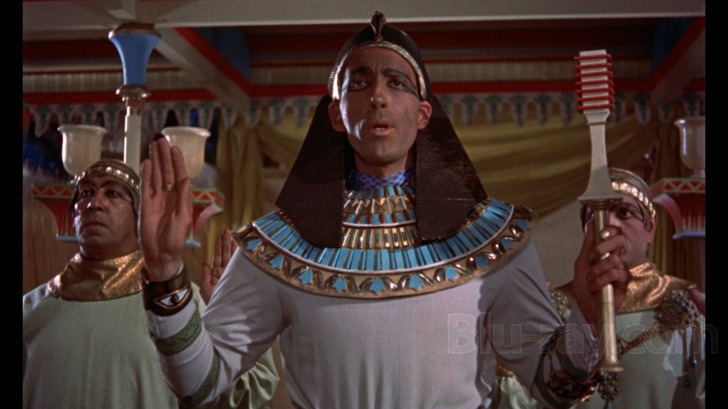
The Mummy's original mono track has been encoded in lossless DTS-HD MA 1.0, and the source material is in fine shape, with no pops, distortions or distracting background hiss. Dialogue is always clear, as are the sound effects. German-born composer Franz Reizenstein (Circus of Horrors) provided the classical score.
The Mummy Blu-ray Movie, Special Features and Extras 
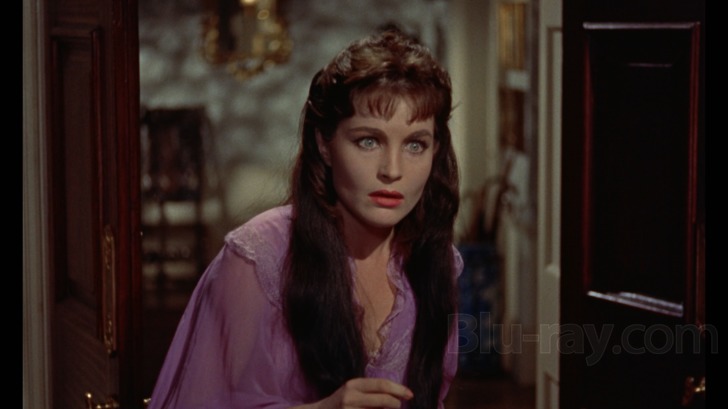
Other than a trailer (480i; 1.67:1, enhanced; 2:26), the disc has no extras. Warner's 2003 DVD was similarly featureless.
The Mummy Blu-ray Movie, Overall Score and Recommendation 
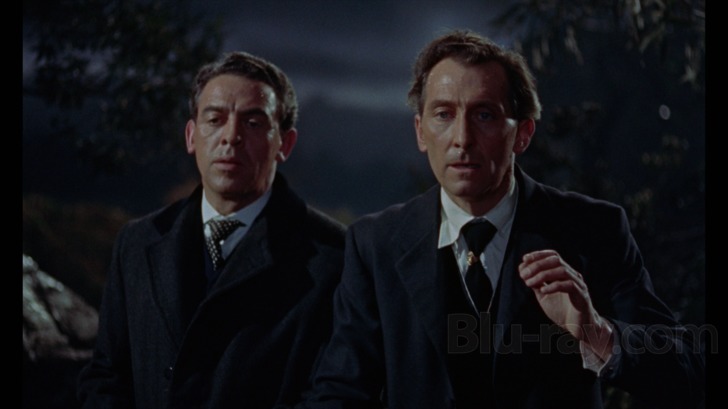
Unlike its Frankenstein and Dracula films, Hammer's The Mummy had no sequels. Hammer made three more "mummy" films from unrelated sources, but, despite its success, The Mummy remained an only child. There is a Region B-locked U.K. edition by Lionsgate that contains substantial extras, but for those without region-free capability, or who are not interested in extras, Warner's new release is a quality Blu-ray, and the film itself is a classic. Recommended.
Similar titles
Similar titles you might also like

Taste the Blood of Dracula
1970

Frankenstein Must Be Destroyed
1969

Horror of Dracula
Dracula / Warner Archive Collection
1958

Dracula Has Risen from the Grave
1968

Scars of Dracula
1970

The Curse of Frankenstein 4K
Warner Archive Collection
1957

Dracula A.D. 1972
1972

Frankenstein and the Monster from Hell
1974

The Devil Rides Out
The Devil's Bride
1968

House of Usher
The Fall of the House of Usher
1960

Blood from the Mummy's Tomb
1971

The Plague of the Zombies
1966

The Mummy's Ghost
1944

The Evil of Frankenstein
Collector's Edition
1964

The Mummy's Hand
1940

The Brides of Dracula
Collector's Edition
1960

Black Sunday 4K
The Mask of Satan / La maschera del demonio 4K
1960

To the Devil a Daughter
1976

Dr. Jekyll and Sister Hyde
1971

Abbott and Costello Meet Frankenstein 4K
1948
